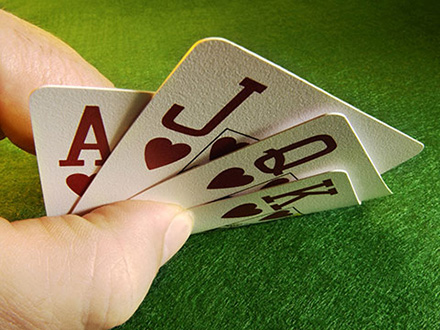The rules of the Omaha poker variant
The rules of Omaha poker: similar to Texas Hold'em ... but not too much.

The Omaha poker variant follows in general the same rules as Texas Hold'em and also shares the various game phases with it.
There are two substantial differences compared to the hold'em: Each player receives 4 covered cards, instead of 2.
The point must necessarily be composed using 2 of the cards in your hand, combined with 3 cards on the table.
The OMAHA poker variant is usually played in the types of limits (maximum 3 relaunches for each turn of episodes) or Pot Limit (the maximum relaunch is equal to the amount of the dish). It may rarely happen to participate in no limits tables.
"Doors" episodes and bet in the dark:
At the beginning of each hand you arbitrarily choose a Mazziere, whose position will move a place to the left at the end of each hand.
The two players who are on the left of the Mazziere (or dealer, indicated with a button in online poker) must make a mandatory episode: the first carries out the small blind, or small darkness, the second the big blind, or large darkness. These episodes serve to ensure that the dish is not empty and tend to double with the progress of the game, generally the times are between 5 and 15 minutes.
The amount of the large darkness represents the minimum amount that can be bet during the hand: for example, at a no limit omaha table $ 5/$ 10, the small darkness is $ 5, the large darkness is $ 10, as well as The minimum amount that players can bet during the hand is 10 $. In some cases, there is also a "ante" episode, generally lower than the dark and mandatory for all players, small and large darkness included.
Distribution of cards and pre-FLOP:
Once all the mandatory episodes were made, the Mazziere distributes 4 cards covered with each player and the first episode lap begins.
The first to speak (i.e. the first to carry out an action) is the player who is on the left of the great darkness, commonly called the "Under the Gun" player.
Note: Only during the first episode lap the first to speak is the player to the left of the great darkness. In all other cases, the first to speak is the person who is on the left of the Mazziere, that is, the little dark. If all the players except one have lined, the hand ends here and the dish is won by the only remaining player. When, on the other hand, all the players left at the table called the highest episode, proceed with the flop.
The flop, first 3 cards:
At this point the Mazziere distributes 3 uncovered cards on the table, called community, as all players can (and must) use them to tie their point. Another turn of episodes begins.
As usual, when all the remaining players see the highest episode, we proceed with the turn.
The turn, fourth paper:
The Mazziere puts on the table a fourth discovered card and a third round of episodes begins. If there is not only one player at the table, we proceed to River.
River and the showdown:
At this point the dealer puts the fifth and last card common to all players on the table. We proceed with the last tour of bets.
When all the participants at the table called the highest episode, the showdown is proceeded, that is, the verification of the best point. The first player to show his cards is the one whose episode was called by the other players.
The point is always made up of 5 cards among those available, but it is bound to the following rule: two cards must belong to the player, the other 3 must be chosen from those available on the table.
Note: If the players who have called the highest episode, realize they have lost their hand, they can decide not to show their cards to others.
The hand is over, the Mazziere moves a position to the left and the game proceeds in the same way.
Strategic differences compared to Texas Hold'em:
It is good to highlight that the high number of cards with which it is possible to tie the points, leads to a substantial strategic difference compared to Texan poker. In general, having 4 cards in hand greatly increases the possibilities of having a strong point already at the flop, but attemination: even the chances of the opponents increase in the same way.
Even the behavior known as "Slow Play", that is, pointing little despite having a strong point to prevent others from deciding for fold, it is to be taken with due caution in the Omha Poker, as the situation could overturn much more quickly than At Texas Hold'em.











